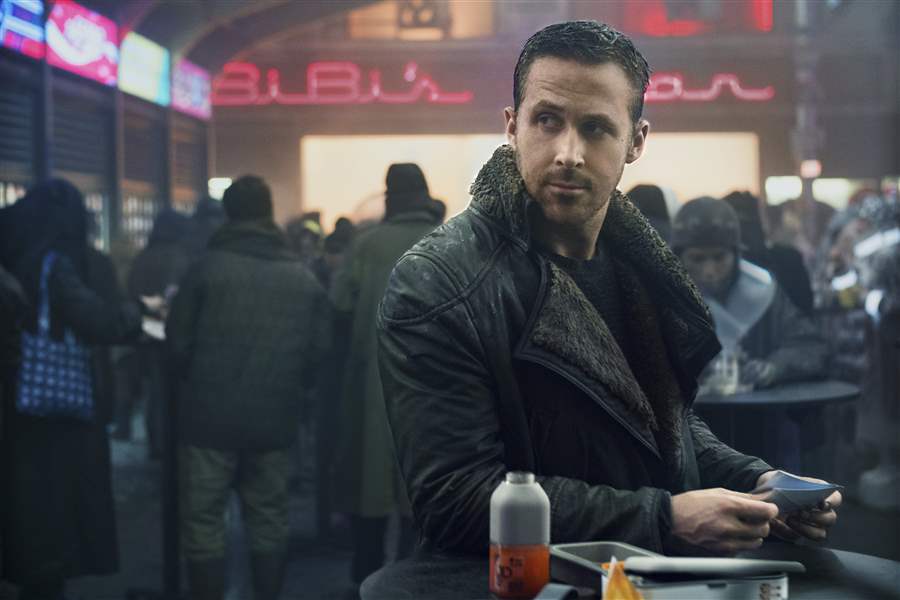
Marvelous 'Blade Runner 2049' builds on the vision of the original
10/5/2017
Ryan Gosling in a scene from 'Blade Runner 2049.'
WARNER BROS. PICTURES
As is often the case with epochal films, Blade Runner was so visionary and profoundly unique when released in 1982 that it baffled and flopped.
Based on Philip K. Dick's 1968 novel Do Androids Dream of Electric Sheep?, Ridley Scott's haunting dystopian and neo-noirish science-fiction masterpiece envisioned a future in which replicants (flesh-and-blood androids) are nearly impossible to differentiate from humans, with a police force composed of “blade runners” (whose ranks include Harrison Ford) whose job it is to hunt down and “retire” (kill) those replicants who break the rules.
Now Blade Runner is among a handful of those truly influential films so embedded in popular culture that their pre-history doesn’t really exist. These movies seem to have been with us forever.
Blade Runner 2049 carries that weight and the expectations that come with it as nobly as a blockbuster can; it’s an odd sequel — one that was never really asked for or demanded — that’s familiar yet inventive and fresh. Blade Runner 2049 is not unlike George Miller’s Mad Max: Fury Road, a 2015 sequel for the ages that spectacularly reimagined and redefined the post-nuclear wasteland Miller forged decades ago with Mad Max and Road Warrior.
Scott does the same with Blade Runner 2049, but not in the capacity of director, rather as executive producer and, more importantly, caretaker of the Blade Runner legacy.
Directed by Denis Villeneuve. Screenplay by Hampton Fancher and Michael Green. A Warner Bros. release playing at Franklin Park, Fallen Timbers, Levis Commons, Bowling Green, and Mall of Monroe. Rated R for violence, some sexuality, nudity, and language. Running time: 164 minutes.
Critic's rating: ★★★★★
Cast: Ryan Gosling, Harrison Ford, Ana De Armas, Robin Wright, Dave Bautista, and Sylvia Hoeks
In his stead is acclaimed director Denis Villeneuve (Arrival, Sicario), a gifted, distinctive filmmaker in his own right, whose artistic bent and cognitive depth complement what only months ago was a creative impossibility: an informed and remarkable tribute to Scott’s masterwork that reinvents Blade Runner with this bigger and bolder genre template.
The buildings are towering and often monstrous. The dirty streets are congested with bedraggled pedestrians in a hurry or shopkeepers with wares to sell. And the bigger question about humanity — blade runner and replicants — remains.
The sequel also evokes the original’s juxtaposition of chilly atmosphere and oppressive desperation with colossal neon-sign wonder and technological marvel. Dangerous storms, foggy pollution, and a canopy of hopelessness cloud the overrun Los Angeles metropolis, though in the three decades since Blade Runner's 2019 setting these hell-on-Earth tribulations have only intensified for those unable to leave Earth for a new life “offworld.” For them, life isn’t a gift but a curse.
Before the screening, critics were read a personal note — a plea, really — from Villeneuve to not reveal too much of the film in our reviews, a request with which I will happily comply.
What I can tell you is that in 2049 there is a new and improved replicant, one that's even more human. Ryan Gosling plays a by-the-book blade runner named K who, in the course of his duties, uncovers something significant enough to cause him to rethink what he knows and to reevaluate his orders. And that’s just the start.
The trailers have already made the big reveal of K seeking and finding Rick Deckard (Ford), the former Blade Runner who abandoned his job to be with Rachael (Sean Young) the beautiful replicant he saved. It was a fairly conclusive ending, until Scott and others suggested that Deckard himself was a replicant — he just didn’t know it. (After recently watching Scott's final cut of Blade Runner, I can say it’s a compelling idea that, symbolism aside, doesn’t always mesh with the plot.) Deckard is older, grumpier, and wishes not to be found.
As with Scott’s original, Blade Runner 2049 is a visual marvel: The showcase special effects are meaningful characters to the story and never obtrusive, while the film exists as a series of striking and haunting images — an astounding symmetry of lights, colors, staging, and framing painted with the camera on a big-screen canvas by Villeneuve and the great cinematographer Roger Deakins.
Gosling and Ford as well as the other performances are uniformly impressive and true to the characters and their motivations. Perhaps the biggest compliment to be paid to the cast is that it stands tall in a large film that could otherwise dwarf them.
Blade Runner 2049’s soundtrack by Hans Zimmer and Benjamin Wallfisch matches the sequel’s appreciation for the original film, with musical callbacks to Blade Runner’s acclaimed future-as-now synthesizer score by Vangelis, before departing on new yet familiar-enough excursions. As the tone of the film gets more aggressive, so does the music, bordering on industrial.
As to the those big questions ... Blade Runner 2049 is conclusive about most things, but also asserts its own set of questions. And that’s not a spoiler.
A shared thread among the French-Canadian director’s films are challenging if not probing social queries that are left unanswered (hence the challenge), as well as significant plot twists and flawed heroes on long roads to redemption, though they don’t know it.
That’s as true of Blade Runner 2049 as it was of Blade Runner.
Just as it is that this sequel is as epochal as the film that spawned it.
Contact Kirk Baird at kbaird@theblade.com or 419-724-6734.